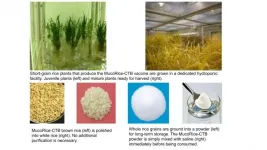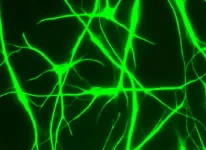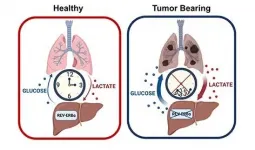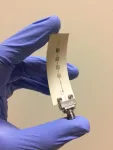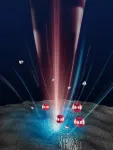Toxicity of protein involved in Alzheimer's triggered by a chemical 'switch'
Spotlight on amino acids causing tau protein toxicity might lead to new therapies
2021-06-26
(Press-News.org) Tokyo, Japan - Researchers from Tokyo Metropolitan University have discovered that a specific chemical feature of a key protein known as tau may cause it to accumulate in the brain and trigger illnesses like Alzheimer's. They found that disulfide bonds on certain amino acids act to stabilize tau and cause it to accumulate, an effect that got worse with increased oxidative stress. The identification of chemical targets triggering tau accumulation may lead to breakthrough treatments.
The tau protein is key to the healthy function of biological cells. It helps form and stabilize microtubules, the thin filaments that crisscross cell interiors to help keep them structurally rigid and provide 'highways' to shuttle molecules between organelles. However, when they are not formed correctly, they can accumulate and form sticky clumps. In the brain, these aggregates block the firing of neurons and cause a wide range of neurodegenerative diseases known as tauopathies, one of which is Alzheimer's disease. It is vastly important that scientists find the 'switch' that transforms tau from an indispensable part of cell function to a deadly pathology.
A team led by Associate Professor Kanae Ando of Tokyo Metropolitan University has been using model organisms like the Drosophila fruit fly to uncover how specific features of the tau protein cause it to stop working properly. Flies can be genetically altered to express the same tau protein as in humans. By systematically modifying parts of the gene encoding for tau, they have been trying to pinpoint how certain features of mutant tau proteins affect their behavior.
In their most recent work, they found that alterations to amino acid residues in the protein known as cysteines in two different locations (C291 and C322) had a drastic effect on the amount and toxicity of tau. In a further breakthrough, the team pinned down the specific chemical feature responsible for making them toxic to normal cell function, that is, disulfide bonds formed by these cysteine groups. The toxic accumulation of tau got worse when cells were put in an environment with elevated levels of reactive oxygen species, as thiol groups on the cysteines were oxidized to form disulfide links. Biochemical environments with elevated oxidative stress are similar to those seen in patients with tauopathies. The co-expression of antioxidants to counter this effect helped natural processes clear away tau proteins, resulting in dramatically lower tau levels.
The team hope that knowledge of exactly which chemical groups are responsible for tau toxicity may lead to novel therapies which reduce or prevent tau accumulation, helping sufferers of tauopathies around the world.
INFORMATION:
This work was supported by a Grant-in-Aid for Scientific Research on Innovative Areas (Brain Protein Aging and Dementia Control) [JSPS KAKENHI Grant number 17H05703], a research award from the Hoan-sha Foundation, the Takeda Science Foundation, a research award from the Japan Foundation for Aging and Health, a Grant-in-Aid for Scientific Research on Challenging Research (Exploratory) [JSPS KAKENHI Grant number 309 19K21593], and a Grant-in-Aid for Scientific Research on Innovative Areas (Brain Protein Aging and Dementia Control) [JSPS KAKENHI Grant number 26117004].
[Attachments] See images for this press release:
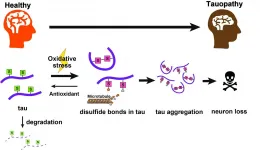
ELSE PRESS RELEASES FROM THIS DATE:
2021-06-26
A new vaccine to protect against deadly cholera has been made by grinding up genetically modified grains of rice. The first human trial has shown no obvious side effects and a good immune response. Researchers based at the University of Tokyo and Chiba University have published the peer-reviewed results of the Phase 1 clinical trial of the vaccine, named MucoRice-CTB, in The Lancet Microbe.
Vaccine manufacturing has made enormous strides in 2020, spurred on by COVID-19. However, the complexity of mRNA-based SARS-CoV-2 vaccines has highlighted the value of inoculations that can be made, transported and stored cheaply and without refrigeration.
The MucoRice-CTB vaccine is stable at room temperature from start to finish.
"I'm very optimistic for the future of our MucoRice-CTB vaccine, ...
2021-06-26
Just as humans have their own individual personalities, new research in the Journal of Comparative Psychology shows that elephants have personalities, too. Moreover, an elephant's personality may play an important role in how well that elephant can solve novel problems.
The article was written by Lisa Barrett and Sarah Benson-Amram in the University of Wyoming's Animal Behavior and Cognition Lab, led by Benson-Amram. It may be viewed here.
The authors of the paper tested 15 Asian elephants and three African savanna elephants in three zoos across the country -- the San Diego Zoo, the Smithsonian's National Zoological Park and the Oklahoma City Zoo -- with the help of elephant caretakers.
Previous work from Barrett and Benson-Amram demonstrated ...
2021-06-26
FINDINGS
A UCLA-led study comparing brain cells known as astrocytes in humans and mice found that mouse astrocytes are more resilient to oxidative stress, a damaging imbalance that is a mechanism behind many neurological disorders. A lack of oxygen triggers molecular repair mechanisms in these mouse astrocytes but not in human astrocytes. In contrast, inflammation activates immune-response genes in human astrocytes but not mouse astrocytes.
BACKGROUND
Although the mouse is a ubiquitous laboratory model used in research for neurological diseases, results from studies in mice are not always applicable to humans. In fact, more than 90% of drug candidates that show preclinical promise for neurological disorders ultimately fail when tested in humans, in part ...
2021-06-25
Crude oil production and natural gas withdrawals in the United States have lessened the country's dependence on foreign oil and provided financial relief to U.S. consumers, but have also raised longstanding concerns about environmental damage, such as groundwater contamination.
A researcher in Syracuse University's College of Arts and Sciences, and a team of scientists from Penn State, have developed a new machine learning technique to holistically assess water quality data in order to detect groundwater samples likely impacted by recent methane leakage during oil and gas production. Using that model, the team concluded that unconventional drilling ...
2021-06-25
Irvine, CA - June 25, 2021 - New research from the University of California, Irvine reveals how the circadian regulation of glucose production in the liver is lost during lung cancer progression, and how the resulting increase in glucose production may fuel cancer cell growth.
The new study titled, "Glucagon regulates the stability of REV-ERBα to modulate hepatic glucose production in a model of lung cancer-associated cachexia," published today in Science Advances, illustrates how the circadian clock is regulated under conditions of stress such as during lung cancer progression and cancer-associated tissue wasting ...
2021-06-25
After suffering a stroke, patients often are unable to use the arm on their affected side. Sometimes, they end up holding it close to their body, with the elbow flexed.
In a new study, Northwestern University and Shirley Ryan AbilityLab researchers have discovered that, in an attempt to adapt to this impairment, muscles actually lose sarcomeres -- their smallest, most basic building blocks.
Stacked end to end (in series) and side to side (in parallel), sarcomeres make up the length and width of muscle fibers. By imaging biceps muscles with three noninvasive methods, the researchers found that stroke patients had fewer sarcomeres along the length ...
2021-06-25
ROCHESTER, Minn. -- Researchers at Mayo Clinic Cancer Center are studying a potential new chimeric antigen receptor-T cell therapy (CAR-T cell therapy) treatment for multiple myeloma. Their findings were published on Friday, June 24, in The Lancet.
"CAR-T cell therapy is a type of immunotherapy that involves harnessing the power of a person's own immune system by engineering their T cells to recognize and destroy cancer cells," says Yi Lin, M.D., a Mayo Clinic hematologist and lead author of the study.
Dr. Lin says the Food and Drug Administration approved ...
2021-06-25
The promise of 5G Internet of Things (IoT) networks requires more scalable and robust communication systems -- ones that deliver drastically higher data rates and lower power consumption per device.
Backscatter radios ? passive sensors that reflect rather than radiate energy ? are known for their low-cost, low-complexity, and battery-free operation, making them a potential key enabler of this future although they typically feature low data rates and their performance strongly depends on the surrounding environment.
Researchers at the Georgia Institute of Technology, Nokia Bell Labs, and Heriot-Watt University have found a low-cost way for backscatter radios to support high-throughput communication and 5G-speed Gb/sec data transfer using only a single transistor when previously ...
2021-06-25
Three years ago, Arthur Ashkin won the Nobel Prize for inventing optical tweezers, which use light in the form of a high-powered laser beam to capture and manipulate particles. Despite being created decades ago, optical tweezers still lead to major breakthroughs and are widely used today to study biological systems.
However, optical tweezers do have flaws. The prolonged interaction with the laser beam can alter molecules and particles or damage them with excessive heat.
Researchers at The University of Texas at Austin have created a new version of optical tweezer technology that fixes this problem, a development ...
2021-06-25
Want a smartphone that stretches, takes damage, and still doesn't miss a call?
A team of Virginia Tech researchers from the Department of Mechanical Engineering and the Macromolecules Innovation Institute has created a new type of soft electronics, paving the way for devices that are self-healing, reconfigurable, and recyclable. These skin-like circuits are soft and stretchy, sustain numerous damage events under load without losing electrical conductivity, and can be recycled to generate new circuits at the end of a product's life.
Led by Assistant Professor Michael Bartlett, the team recently published its findings in END ...
LAST 30 PRESS RELEASES:
[Press-News.org] Toxicity of protein involved in Alzheimer's triggered by a chemical 'switch'
Spotlight on amino acids causing tau protein toxicity might lead to new therapies

